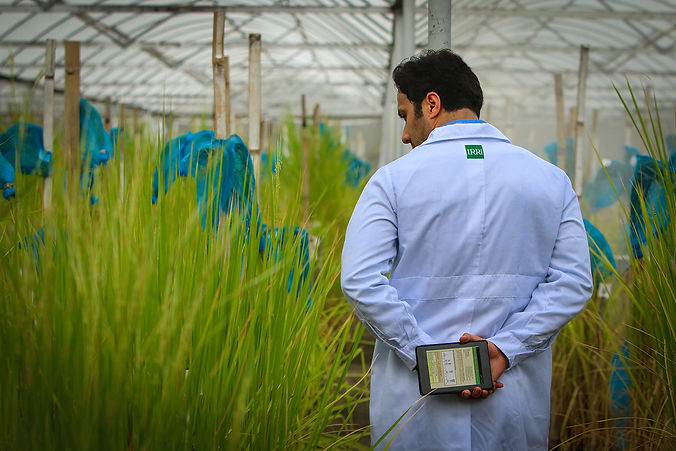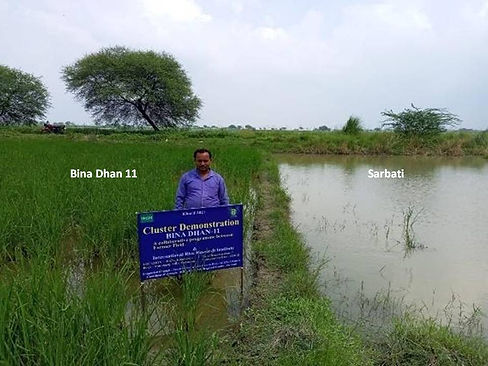

Global impact
The drive to deliver impact across the world

Indian Prime Minister inaugurates IRRI’s Speed Breeding Facility
Prime Minister Narendra Modi inaugurated IRRI’s state-of-the-art Speed Breeding (SpeedBreed) Facility on 23 December 2021 at ISARC in Varanasi.
Speed breeding is an emerging strategy among plant breeders to speed up varietal development through advanced technologies and protocols. This new facility, established with support from the Department of Biotechnology and the Department of Agriculture and Farmers’ Welfare, will accelerate the breeding of new crop varieties, which can help Indian farmers increase their incomes and be less vulnerable to climate change effects.
Bangladesh Rural Development Academy and IRRI train women farmers to be seed entrepreneurs
The Rural Development Academy-Bogura in Bangladesh and IRRI organized a workshop that strengthens women farmers’ knowledge on proper seed certification guidelines and seed quality control issues. Thirty women-led farmers groups attended the seed quality control and marketing workshop in Narchi Village, Shahjahanpur sub-district on 08 November 2021. The workshop is an initiative under OneRice, a unified rice breeding strategy to develop and deliver better rice varieties faster to the farmers in Africa and Asia.


Reducing South Asian Farmers’ Risk Through the Flood-tolerant BINA Dhan-11
BINA Dhan-11 is an early-maturing, high-yielding, variety with short slender grain. It is a flood-tolerant variety developed and released through the Bangladesh Institute of Nuclear Agriculture (BINA) in 2013 under BINA Director General Mirza Mofazzal Islam. The collaboration between IRRI and its national research and extension systems partners has successfully introduced, tested, and scaled this climateresilient product benefitting thousands of smallholder farmers in eastern India and Bangladesh.
CGIAR Supports Transparent, Responsible, and Sustainable Food Systems in Vietnam
IRRI joined Vietnam’s Ministry of Agriculture, other CGIAR centers, international organizations, and the private sector in a series of dialogues ahead of the United Nations’ Food System Summit in September 2021. The events bring together key people from state agencies, academia, NGOs, donor agencies, and industry to help address existing and emerging challenges and opportunities in Vietnam’s agri-food systems and inform policies and investments. This event invited stakeholders to discuss and identify key issues and opportunities for Vietnam’s food systems in the next decade, particularly under the UN’s five Action Tracks:
-
Access to safe and nutritious food for all
-
Sustainable consumption patterns
-
Sustainable food production at scale
-
Competitive, inclusive, and equitable food value chains
-
Resilience to vulnerabilities, shocks, and stress.

Increasing Prosperity of Small and Marginal Farmers Calls for Strong Research Collaboration
A strong collaboration between IRRI and its national agricultural research and extension system partners is crucial to increasing the prosperity of small and marginal farmers through the proliferation of rice science, according to ISARC Director Sudhanshu Singh. Dr. Singh made the statement on 19 June 2021 during the online Review and Planning Workshop of the project Climate-Smart Management Practices and the Climate-smart Management for the Stress-prone Environment sub-project under the Indian Council of Agricultural Research-
IRRI Collaborative Project 2.1.

Gender Transformative Change Critical for an Equitable Rice Sector in Africa
The extent of women’s participation and the roles they play in agri-food systems may vary across countries and regions, but the reality remains the same: women are central to the sustainable development of agri-food systems. However, social, political, and market institutions, which govern food systems, portray elements of gender bias at all levels, holding back women in vicious cycles of time and income poverty.
Ranjitha Puskur, research leader for Gender and Livelihoods at IRRI, presented Gender Equality and Sustainable Rice Agri-food
Systems Transformation in Africa: Nurturing Synergies at the EARC 2021. While women have the potential to become powerful agents of change, driving food systems transformation in Africa, Dr. Puskur suggests a shift in perspective to ask, “How can agri-food systems support gender equality?”
East African Countries Champion Integrated Rice Sector Development in the Region to Curb Escalating Imports
The East Africa Rice Conference (EARC) 2021 gathered key players from Africa’s agri-food sector. They listed the top regional priorities to be: increased availability and access to quality inputs via harmonized regional policies and regulations, public-private partnerships support in value-chain upgrading and regional trade in local rice, and strengthened regional and national platforms to promote policy coordination and investment. These priorities will champion integrated rice-sector development in the region.
EARC 2021 was organized by the Africa Rice Center, the Agricultural Policy Research in Africa Programme of the Future Agricultures Consortium, the Centre for African Bio-Entrepreneurship, the Coalition for African Rice Development, IRRI, and the Japan International Cooperation Agency, with support from UK Aid and the Foreign, Commonwealth & Development Office of the United Kingdom. The event featured prominent scientists, experts, and thought leaders, who discussed local and regional challenges and presented a range of opportunities for research and development in rice-based agri-food systems.
Vietnam Expands CS-MAP Program After Successful Implementation in Mekong Delta
The Winter-Spring rice crop of 2019–2020 was a successful harvest in the Mekong River Delta (MDR) despite the most severe salinity intrusion in history. The salt-water intrusion period in 2020 started almost 3 months earlier and lasted longer compared with the previous years’ average. The salinity levels constantly remained at high levels from February to May, threatening rice production. Nevertheless, MRD provinces managed to win big — the result of a set of adaptive measures, particularly the shift in cropping structure and sowing and harvesting calendars, guided by the implementation of the Climate-Smart Mapping and daptation Planning (CS-MAP) approach.
The CS-MAP methodology was developed by scientists at IRRI within the CGIAR Research Program on Climate Change Agriculture and Food Security in Southeast Asia and in cooperation with Vietnam’s Ministry of Agriculture and Rural Development. This approach was a response to the increasing adverse impacts of climate phenomena that negatively affect agricultural production in Vietnam.

After COVID-19: Where to next for climate-resilient agricultural development in the global south?
The conjunction of the agricultural innovation system and the food system needs to be understood to see the options available to smallholder farmers. There is no “one-size-fits-all” technological solution. Instead, there are radically different and competing perspectives on the right path to take—and for which scientific evidence by research organizations, such as CGIAR, can help national governments to assess the most sustainable pathway for their communities.
The COVID-19 pandemic may present an opportunity to build back better if we move away from the standard model of structural transformation that has permeated development practice over recent decades. Instead, if we focus on reinvigorating rural communities through a climate-resilient smallholder agriculture sector and move away from the urban bias, then there is the hope that the rural sector will be the engine of recovery in the global south.
